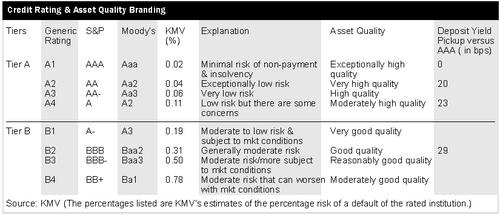|
|
Saturday, 7th February 2026 |
| The risk/reward paradigm - lower ratings or greater risk? |
Back |
| Every corporate treasurer, investment manager and many private individuals have significant cash surpluses to invest. Thanks to the myriad of information services available, people are keenly aware of the comparative returns available to them. Many investors spend significant time in the ‘everlasting search for higher yield’. However, not all investors are aware that each additional basis point of yield brings with it additional risk – namely default risk. John Coffey and Niall Cuddihy examine the different alternatives available to a cash investor, identifying, for each case, the risk/return issues involved. |
Bank defaults are rare events, even more so where a bank is seen as pivotal to its home nation and actively involved in the retail market. In such circumstances a state-led rescue is likely, albeit not guaranteed. Defaults can be caused by: Exceptional loan losses; Rogue traders; Extreme recessionary conditions; Uncontrolled expansion policies with inadequate risk management. Whereas these events can occur at any time, the default risk is higher during currency crises & economic downturns. Although banks are currently very well capitalised, we are probably at the top of the economic cycle with risks likely to increase from here. | | Niall Cuddihy |
Fixed Deposits
The Fixed Deposit is a fixed sum of money deposited for a fixed period at a fixed rate of interest. The Fixed Deposit investment period ranges can be overnight up to five years. Whereas the rate is guaranteed, the fixed maturity means that this asset is not liquid. However we are finding more and more banks willing to facilitate clients by breaking deposit at a small cost.
Certificate of Deposits (CDs)
A negotiable certificate issued by a commercial bank as evidence of a deposit with that bank which states the maturity value, maturity rate and interest rate payable. CDs vary in size with maturities ranging from a few weeks to several years. CDs may normally be redeemed before maturity, by sale on the secondary market or back to the issuing bank. Credit risk is identical to the risk for Fixed Deposits but the liquidity is better. Consequently CDs often yield a few bp’s below the equivalent Fixed Deposit.
Call Deposits
Most banks offer Call Deposits where rates are linked to short-term interbank rates. Whereas they are very liquid, offering access to your cash at short notice – the rate is not guaranteed & will move in line with the market. | | John Coffey |
Our own ‘Flexicall’ product offers higher rates, lower administration & same day access to money. Many fund managers & other companies, whose daily cashflows are somewhat unpredictable, find it much more useful to use this kind of account rather than a string of overnight deposits.
Commercial Paper (CP)
CP is an unsecured promissory note issued by a corporation for a specific amount and maturity. The bulk of CP issued is for maturities of less than two months. The original purpose of commercial paper was to provide funds for short-term seasonal and working capital needs. Commercial paper is usually issued by companies with high credit ratings (A1, P1) & therefore only yields 1bp or 2bp above AA bank deposit rates. Lower rated CP (A2) can yield 6bp more. The level of liquidity is less & depends on the secondary market for the issue concerned.
Money Market Funds (MM Funds)
These are mutual funds, which invest, in short-term instruments such as treasury bills, commercial paper, short-dated bonds and asset backed securities with a duration of less than a year. Often, these funds try to keep the average maturity or quantitative duration within 2-3 months.
 | | Credit Rating & Asset Quality Branding |
MM Funds are mostly AAA rated with low credit risk, excellent liquidity and risk diversification. These funds are professionally managed, convenient and very flexible. However they are set up on a benchmark basis ( ie EONIA, LIBOR etc) & the return is not guaranteed. Consequently, you are depending on the performance of the fund manager to achieve this benchmark. He may underperform & you also have to pay his fees (typically 6bp). There may be also a number of reporting issues (especially for U.S companies) which means additional administration.
The Irish market is known to be extremely competitive and most banks will pay attractive interest rates. When choosing between banks, it is important to identify what extra risk you are taking for the extra yield you receive. The table above indicates, by credit rating, the different risks available and the approximate related pick-up available, in basis points. The key issue for you is whether the extra default risk you are taking on is worth it for the yield pick-up you receive.
Although banks rarely fail,it does happen : remember Barings. Do you really want to take this kind of incremental risk for just a few basis points (bear in mind that each extra basis point in yield that you achieve, may bring you no more than an extra 28 cent per million per day – for example switching from an A rated bank to an AA rated one brings 84 cent per million for the cost of a 60 per cent increase in default risk (0.04 Versus 0.11) – and will you be able to justify it to your board afterwards! CAVEAT EMPTOR! |
John Coffey is head of treasury ALM and Niall Cuddihy is a senior dealer in treasury ALM at BNP Paribas, Dublin.
|
| Article appeared in the September 2005 issue.
|
|
|